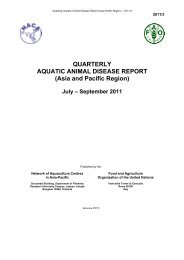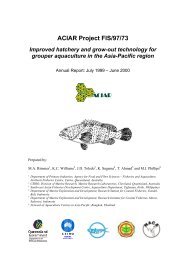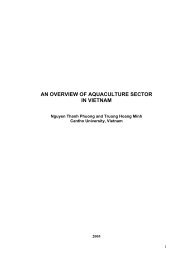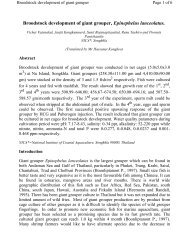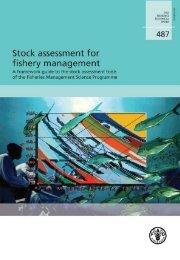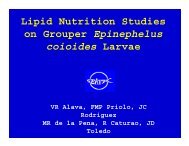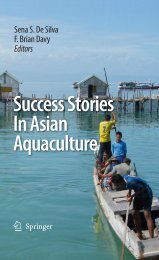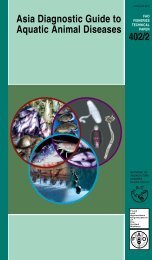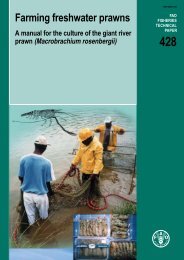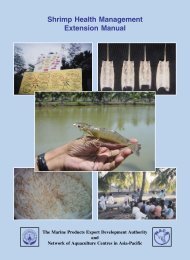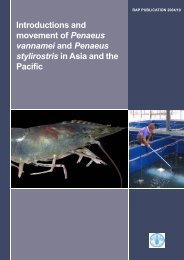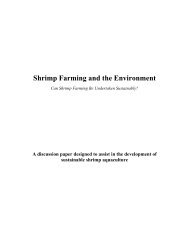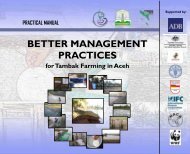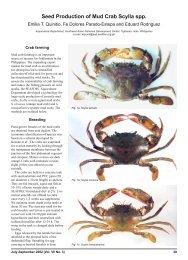Training of Trainers - Library - Network of Aquaculture Centres in ...
Training of Trainers - Library - Network of Aquaculture Centres in ...
Training of Trainers - Library - Network of Aquaculture Centres in ...
- No tags were found...
Create successful ePaper yourself
Turn your PDF publications into a flip-book with our unique Google optimized e-Paper software.
If you have a website, all you need to make a podcast is a cheap microphone and some audio record<strong>in</strong>g s<strong>of</strong>twareand some <strong>in</strong>terest<strong>in</strong>g discussion to record – <strong>in</strong>terviews with progressive farmers, expert panel discussions,workshop presentations, even your own ‘radio play’ or documentary. Recommended resources are:• How to podcast (tutorial website): http://www.how-to-podcast-tutorial.com/00-podcast-tutorial-fourps.htm• Audacity (free audio record<strong>in</strong>g/edit<strong>in</strong>g s<strong>of</strong>tware): http://audacity.sourceforge.net/Social network<strong>in</strong>gSocial network<strong>in</strong>g websites take the web publish<strong>in</strong>g concept one step further by allow<strong>in</strong>g members <strong>of</strong> the public toparticipate as well. Instead <strong>of</strong> merely present<strong>in</strong>g <strong>in</strong>formation to people, community websites allow their membersto communicate and exchange <strong>in</strong>formation among themselves. The most common form <strong>of</strong> community website is a“discussion forum”.Onl<strong>in</strong>e communities are a unique tool <strong>in</strong> that they allow an <strong>in</strong>dividual to access the collective knowledge <strong>of</strong> a largegroup <strong>of</strong> people that may be scattered all over the world. They provide a “virtual venue” where people with similar<strong>in</strong>terests can “meet” each other, share experiences and solve common problems. One <strong>of</strong> the most powerfulapplications <strong>of</strong> onl<strong>in</strong>e communities is a “self-help” group. In a highly decentralised environment, empower<strong>in</strong>gstakeholders to help each other through a community website may be more practical than try<strong>in</strong>g to provide directassistance to them on an <strong>in</strong>dividual basis.As with other Internet technologies, onl<strong>in</strong>e communities are only useful to a subset <strong>of</strong> most stakeholder groups.They must reach a critical mass <strong>of</strong> participants <strong>in</strong> order to become effective tools for technical exchange. Onceactivity reaches a certa<strong>in</strong> level, the feedback and mutual <strong>in</strong>teraction among members becomes largely selfsusta<strong>in</strong><strong>in</strong>g.Achiev<strong>in</strong>g the critical mass <strong>of</strong> members needed to <strong>in</strong>itiate an ongo<strong>in</strong>g “conversation” can be difficult.The most important aspect is to identify an area <strong>of</strong> common <strong>in</strong>terest to target stakeholders that will b<strong>in</strong>d themtogether as a social group.Recently ‘social network<strong>in</strong>g’ sites such as Facebook have become the dom<strong>in</strong>ant force <strong>in</strong> onl<strong>in</strong>e communities dueto their <strong>in</strong>clusion <strong>of</strong> powerful <strong>in</strong>tegrated tools for network<strong>in</strong>g and connect<strong>in</strong>g people and locat<strong>in</strong>g mutualacqua<strong>in</strong>tances. They also tend to be easier to use and understand (and more <strong>in</strong>terest<strong>in</strong>g) than the traditionaldiscussion forums, and are by far the best way to start an onl<strong>in</strong>e community. Start<strong>in</strong>g a Facebook page, or even aTwitter page, for you or your organisation can be a very convenient way to <strong>in</strong>teract and stay <strong>in</strong> touch with onl<strong>in</strong>estakeholders.• Facebook: http://www.facebook.com• Twitter: http://www.twitter.comFurther read<strong>in</strong>gLev<strong>in</strong>e, R., Locke, C., Searls, D., We<strong>in</strong>berger, D. (1999). The Cluetra<strong>in</strong> Manifesto: The end <strong>of</strong> bus<strong>in</strong>ess as usual.Perseus Books. Available onl<strong>in</strong>e from: http://www.cluetra<strong>in</strong>.com/.Wilk<strong>in</strong>son, S., Coll<strong>in</strong>s, J. (2007). Guidel<strong>in</strong>es on digital publish<strong>in</strong>g: A practical approach for small organizations withlimited resources. FAO/FishCode Review No. 20, FAO, Rome. 68pp.Wikipedia. Web 2.0. Available onl<strong>in</strong>e from: http://en.wikipedia.org/wiki/Web_2.0.90



